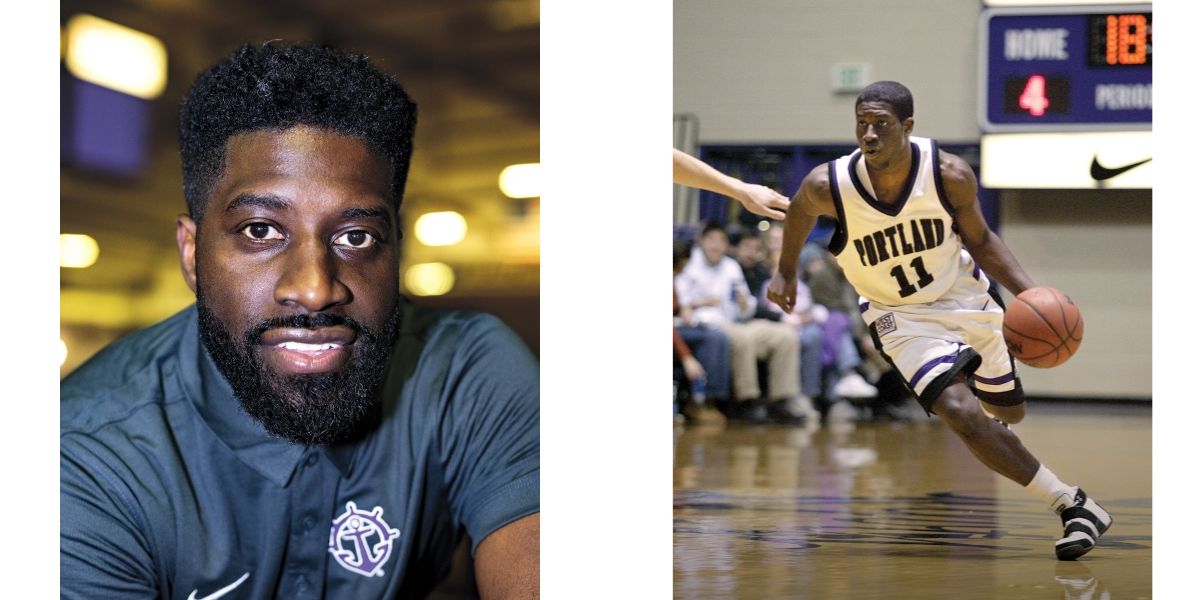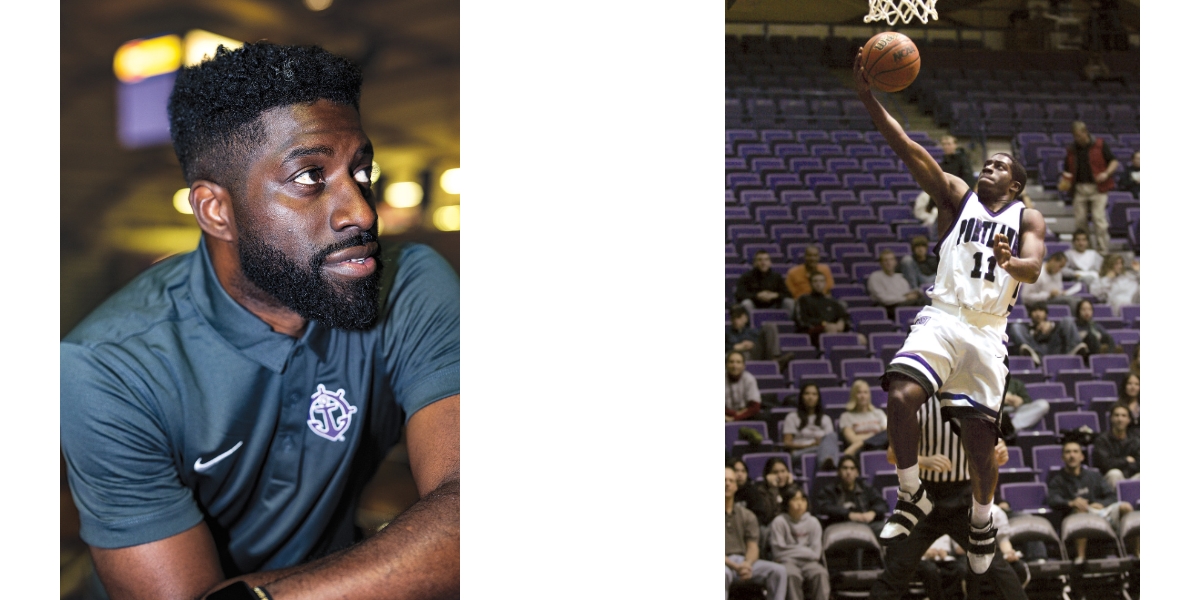
Portland Magazine
November 10, 2023
Rip City Remix brings a beloved Pilot—Pooh Jeter—back to The Bluff. His return to Chiles comes with a treasure trove of memories.
Story by Joe Freeman

Photo Credits: Nick Mendez (Left) UP Athletics (Right)
THE HIGHLIGHTS OF Eugene “Pooh” Jeter’s storied college basketball career endure to this day, nearly two decades after he left The Bluff.
The stunning victory over powerhouse Gonzaga as a freshman. The memorable game-winning jumper against Long Beach State. The three all-West Coast Conference selections. The 1,708 career points.
But for University of Portland senior associate athletic director Jason Brough, the memories of Jeter’s legacy stretch beyond the concrete dome of the Chiles Center and spread all over campus, where Jeter roamed from 2002 to 2006.
“Everybody loves Pooh,” Brough said. “He was a unique and dynamic player. One of the best in school history. But the thing that I remember most is that everybody on campus loved him. From the janitor to the food service workers to the professors, everybody knew him, everybody respected him, and everybody loved him. He made such an impact on campus, just had this presence that was so awesome. Even to this day, the people who are still around from that era are so excited to see him when he comes back to campus and walks around.”
And, to their delight, Jeter will soon be walking around The Bluff more often. In a divine twist of fate, his professional career has led him back to a place he calls his “second home” and a campus he credits with shaping him into a man. The one-time UP basketball star has been hired by the Portland Trail Blazers for a unique dual role in which he will split his time as a player development coach for the NBA team and as an assistant general manager for the franchise’s newly created minor league team, the Rip City Remix.
The Remix will compete in the G-League. They will play their home games at the Chiles Center.
“I’m coming hoooooome,” Jeter said, barely able to contain his enthusiasm. “You never know why you go through certain things in life, why you land at certain places. But maybe I landed at UP all those years ago to plant a seed that I had to grow into. This place is so special and it means so much to me. I always make sure I’m staying tapped in with the holy spirit inside me and keeping God first. I know everything else will follow. That’s my motto, and that has led me back to UP.”
And oh what a journey it has been. Jeter took an unconventional path to The Bluff, arriving as part of former coach Michael Holton’s first full recruiting class. For decades, college basketball coaches have leaned on Amateur Athletic Union (AAU) basketball for recruiting, using the vast network of all-star summer teams to stock their rosters. But Jeter and his family eschewed the AAU basketball scene, which they found too political and too seedy, and bet on his talent, believing that work ethic and faith would fuel his college dreams. Jeter was discovered by Holton’s assistant, Rich Wold, at a camp in San Diego. Jeter was small—generously listed at 5-foot-11—but quick, athletic, smart, and tenacious.
After watching Jeter perform at that summer camp and asking around, Wold was sold. Jeter attended Junipero Serra High school in Gardena, California, a suburb of Los Angeles, and emerged as one of the top players in the city as a senior, averaging 23.3 points, 10.3 assists, and 3.4 steals his final season. Before long, he and childhood friend Donald Wilson were strolling UP on a recruiting trip. Jeter was captivated by the lush, green, picture-perfect campus and its laidback atmosphere, and he loved the message Holton and his coaching staff were preaching, suggesting that Jeter and Wilson could play an important role in rebuilding the program.
During their visit, Jeter and Wilson stopped by a Trail Blazers game to watch them play the Los Angeles Lakers. Afterward, Jeter met point guard Damon Stoudamire, a Portland native and former NBA Rookie of the Year. He asked Jeter if he planned on committing to the Pilots, if he was ready to call Portland home. “If I have access to you,” Jeter replied. Stoudamire didn’t blink and shared his phone number.
The next morning, at breakfast, Wilson turned to Holton and announced that he and Jeter were ready to be Pilots. “Coach, we’re coming,” Wilson said. Jeter’s jaw dropped, and he gazed at Wilson with an are-you-kidding-me stare. Holton celebrated. But he also noticed Jeter’s reaction and, sensing hesitation, asked the talented young point guard if he was in. “Coach, I didn’t know he was going to say that,” Jeter replied. “I do like it here. But I need to talk to my parents before I make any decision.”
On the flight back to Los Angeles, Jeter turned to Wilson and asked his friend what in the world he was thinking. “We could come here and we could take this program places,” Wilson said. “Doesn’t it feel right?” It did. And when Jeter made it back to Gardena, he huddled with his parents, gushed about Portland and his experience, and the group made up its mind: he was going to UP.
Jeter made an immediate imprint on The Bluff as a freshman, helping the Pilots upset rival Gonzaga in Spokane and hitting an unforgettable game-winner against Long Beach State in his Los Angeles homecoming. By the end of his career, Jeter was a three-time all-WCC selection, finished as the second-highest scorer in school history, and blossomed into one of the most revered figures on campus. It wasn’t just his effortless basketball talent that drew admirers, but also his easygoing personality, his disarming demeanor, his accessibility, and his omnipresent smile. “It’s hard to find him in a bad mood and he’s always smiling,” said Brough, who was a student for two years and worked in the sports information department for two years during Jeter’s time at UP. Campus security even slipped Jeter a key to the Chiles Center so he could practice after hours. Had Jeter run for ASUP President, he surely would have won in a landslide.
“At one point in time, they were calling it Poohland,” Jeter said of UP, chuckling. “I didn’t make that up. That was just the vibes I was getting.”

Photo Credits: Nick Mendez (Left) UP Athletics (Right)
Jeter’s success at UP set him up for an accomplished professional basketball career that spanned 17 years and touched multiple continents. There were stops in Ukraine, Spain, Israel, China, and France, and he played on multiple NBA Summer League teams, coming oh-so-close to fulfilling his lifelong dream of playing in the NBA. That finally came true in 2010, when he spent one season with the Sacramento Kings. All the while, basketball executives were keeping tabs on the charismatic former Pilot. Just like at UP, as Jeter traversed the globe playing basketball, he endeared himself to everyone, building a vast network of industry contacts and friends.
Off the court, Jeter has emerged as an entrepreneur and mentor to young basketball players in Los Angeles, where he has built a successful small business and created a youth basketball program. His business, Laced, is an upscale retail and online shoe and clothing boutique in Los Angeles with a unique calling card: it’s the only Black-owned store that has an account with Nike. But perhaps Jeter’s biggest passion is Hometown Favorites, a basketball program that helps nurture kids in Los Angeles. The program’s aim is not to merely groom talented players, but also groom well-rounded people, offering guidance in areas such as education, mental health, and financial wellness, in addition to basketball.
“If we’re not visible in their lives, then this generational wealth of knowledge that we all have is not going to be worth it,” Jeter said of current professional players. “We have to show them we’re here. And we have to show them they can do great things. Not all of these kids are going to play professional basketball. We have to prepare them for life after hoops, give them the tools and confidence they need to succeed.”
When Jeter finally retired this year after two twilight seasons playing for the G-League Ignite—where, at 39, he was the league’s oldest player—Jeter knew he wanted to stay in the game. He just wasn’t sure whether he wanted to get into coaching or scouting. The opportunity with the Blazers afforded a chance to try out both, and he says he will spend the next few months learning under fire, writing the next chapter of his life. That it will come under the dome at the Chiles Center, where his basketball journey started all those years ago, is a plot twist he never imagined.
When news broke that Jeter’s life was coming full circle, congratulatory messages poured in from all over the globe. Among the well-wishers was UP President Robert D. Kelly, who welcomed Jeter back to The Bluff with open arms. Jeter’s response?
“That’s great to hear, thank you so much,” Jeter said. “Now that I’m back and part of things, there are no excuses not to retire my jersey.”
He was (mostly) joking, of course. But now that Jeter is officially retired from playing, don’t be surprised if his old No. 11 is raised to the Chiles Center rafters at some point. As he waits for that once-in-a-lifetime moment, Jeter says, he is eager to show his wife, Chyvonne, and their two sons—eight-year-old Eugene and five-year-old Ethan—where his basketball journey began. His second home is now his family’s home.
“I’m just so excited,” Jeter said. “I want to make sure my family gets the same type of feeling and has the same type of experience that I had when I was here. I’m so happy to be back at UP and the Moda Center. I’m ready to do some great things.”
JOE FREEMAN ’99 is a senior writer for The Oregonian/ OregonLive.
University of Portland
5000 N. Willamette Blvd.,
Portland, Oregon 97203-5798
503.943.8000
This website uses cookies to track information for analytics purposes. You can view the full University of Portland privacy policy for more information.
